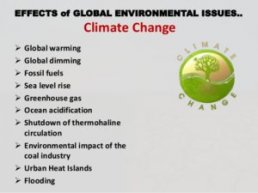Major environmental Problems in developing countries
Pollution is one of the many environmental challenges facing the world today. The impact of pollution is more severe in developing countries, leading to ill health, death and disabilities of millions of people annually. Developed countries have the resources and technologies to combat pollution. As a result of the health risks and the potential impact of climate change, there have been efforts to reduce pollution. However, while this may be easy for developed countries, halting environmental pollution may undermine economic growth and competitiveness of developing countries whose economies depends on natural resources. Developed countries have achieved substantial economic growth and development and can afford to focus on environmental goals because basic living necessities have been achieved.
At every point and in every level of development, countries need to make choices between often conflicting goals. Developing countries desire to ensure energy for all at a competitive price to achieve and sustain economic growth and poverty reduction. The energy poverty experienced in these regions has been linked with the high level of income and non-income poverty in the regions. In their desire to develop and improve the standards of living of their citizens, these countries will opt for the goals of economic growth and cheap energy for all. This may lead to environmental pollution and degradation. More so, energy access, and at a lower price, is necessary to make the industries in developing countries competitive and contribute to economic growth, job creation and development. Ensuring energy access to the population and enhancing the competitiveness of local industries may require providing energy at lower prices through energy subsidies. This will encourage energy over-consumption, waste and inefficiency and also fuel environmental pollution.
Most developing countries, especially those in sub-Saharan Africa, depend majorly on natural resources for revenue and foreign exchange. These economics are driven by funds generated from exploitation of natural resources such as coal, oil and gas, agricultural and forest resources, gold, copper, etc. The livelihood of the masses also depend on these resources. However, the exploitation and processing of some of these resources result in environmental pollution and degradation. For instance, the exploration of oil and the activities of multinational oil companies in the Niger Delta region of Nigeria has caused substantial land, water and air pollution. However, for Nigeria to maintain its current economic growth path and sustain its drive for poverty reduction, oil exploration and production will continue to be a dominant economic activity. This is also the case with a number of other developing countries.
The inevitability of pollution in developing countries has been demonstrated by the Environmental Kuznet Curve. The EKC is a hypothesized relationship between indicators of environmental degradation and income per capita. According to the theory, environmental pollution and degradation increase in the early stages of economic growth, get to a peak point, and reverse in such a way that the environment improves at high income levels. This is based on the fact that developing countries desire industrialization and economic growth and tend to consume more cheap energy. There is also need for developing countries to build roads and rail tracks and develop massive infrastructure to promote economic growth. Such activities that are required at the take-off stage of economic development are substantially energy-intensive.
The important role of industrialization in the development process of developing countries cannot be overemphasized. There is need for structural transformation from small-scale agriculture to industrialization in order for developing countries to experience inclusive and pro-poor growth. However, industrialization requires massive use of energy resources which could lead to pollution and environmental degradation. China would not have achieved the impressive economic growth and development it has recorded in recent years if she had cared about pollution at the initial stage of development. Other developed economies like the OECD are also focusing on environmental sustainability after achieving considerable growth and improvement in the living standard of their citizens. The Chinese economic model is energy intensive, with strong focus on investment and industrialization, and is being adopted by a number of developing countries.
In conclusion, developing countries in their quest for economic development and poverty reduction are expected to put economic growth, energy for all and industrialization at the fore front of their goals before giving consideration to environmental issues. Therefore, compelling developing countries like those in Sub-Saharan Africa and South Asia to pursue environmental goals, particularly reduction in CO2 emissions, will require substantial economic, technological and financial support from developed countries and the international community to compensate for the economic losses associated with reducing pollution.










